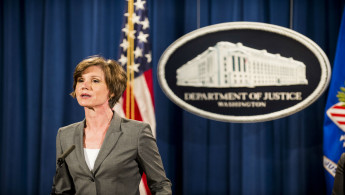US government cuts-off private prisons following newspaper abuse investigation
The US Department of Justice (DOJ) on Thursday announced it was ending the use of private prisons to detain federal inmates, terminating a practice that had become increasingly controversial.
The decision will affect only a small share of the huge detainee population within the United States, which detains one in four prisoners in the world.
In an internal memo released by the department, Deputy Attorney General Sally Yates said her agency would begin the process of ending the federal government's use of private prisons, which had proved more problematic but no less costly than government-managed correctional facilities.
"They simply do not provide the same level of correctional services, programmes and resources; they do not save substantially on costs," Yates wrote.
Yates also cited a recent report by the department's internal watchdog, the Office of the Inspector General, which found that private prisons were more dangerous than those in public hands.
The decision comes on the heel of a number of damning investigative reports published by US news outlets, most notably Mother Jones, which revealed serious deficiencies in staffing and security at a private prison in Louisiana.
The decision will only affect 13 privately run prisons overseen by the DOJ housing just over 22,000 people, or about 11 percent of the federal prison population, mainly foreign nationals. Many are Mexicans incarcerated for immigration violations.
The prisons are run by three companies: Corrections Corporation of America (CCA), GEO Goup and Management and Training Corporation.
Shares in CCA and GEO Group took a nosedive after the announcement, both down nearly 39 percent by midafternoon.
 |
The DOJ's decision does not affect facilities run by the Department of Homeland Security (DHS), which is the private prison industry's largest client in the United States. |  |
The DOJ's decision does not affect facilities run by the Department of Homeland Security (DHS), which is the private prison industry's largest client in the United States.
The DHS relies on private prisons to hold thousands of immigrants and refugees fleeing violence in Central American countries.
The numbers of these detainees has seen a significant increase in recent years under the Obama administration’s expansion of deportation programmes targeting illegal immigrants.
Rights groups have documented a catalogue of rights violations and abuses at private prisons and have repeatedly criticised the government’s use of these facilities.
A group of Central American mothers incarcerated with their children at one such detention centre in Pennsylvania is entering their second week of a hunger strike in an effort to get asylum for their families.
"We are 22 mothers who have been imprisoned at the Berks Family Residential Centre for 270 to 365 days," the group wrote in an open letter addressed to Homeland Security Secretary Jeh Johnson.
"We are already traumatised from our countries of origin. We risked our own lives and those of our children so we could arrive on safe ground. While here our children have considered committing suicide, made desperate from confinement," the women said in their letter.
The Berks Family Residential Centre is one of three DHS facilities specifically designed to house immigrants and refugee families, mostly women and children, awaiting processing.





 Follow the Middle East's top stories in English at The New Arab on Google News
Follow the Middle East's top stories in English at The New Arab on Google News


